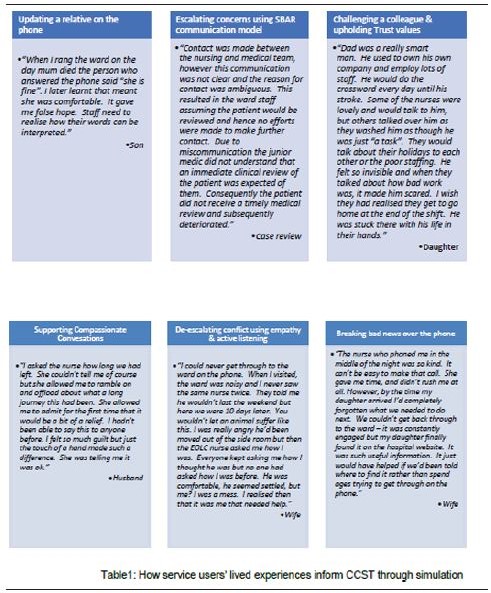
Care provision depends as much on the communication skills of care providers as their clinical skills. In 2021, a 420-bedded acute hospital received feedback from a fifth of bereaved families through its ‘Your Views Matter’ bereavement survey (n=145). 80% rated end of life (EOL) care as good/very good. However, 1 in 10 rated it as poor/very poor. In all but two cases, poor communication was identified as a defining factor. Despite communication being a theme in complaints, communication skills training (CST) was not available to ward staff (WS). Using actor role players (ARP) in simulation has been found to be realistic and valuable to learning [1]. The need for development of a standardised CST course for the 637 ward nurses and 273 nursing assistants was paramount. We established a one-day, level 2, accredited Comprehensive CST (CCST) course specifically for ward staff which sits between Basic CST and Advanced CST. We envision that the CCST course becomes highly regarded across the Trust/region and a priority for WS.
We translated bereaved relatives’ lived experiences into simulations to inform learning (Table 1). Two ARPs simulate the experiences of a fictional inpatient Bobby Day, as he approaches the EOL and those of his wife Bridgette. Uniquely, throughout the day the course follows Bobby through his final hospital journey allowing participants to become emotionally invested in his and his wife’s experience. Simulations address specific communication skills through both forum theatre and fishbowl. Following each simulation, group activities maximise participation and consolidate learning, whilst sharing service users’ words powerfully demonstrates relevance.

 |
The initial four courses have received universal praise from participants, ARP, and accreditors:
100% participants reported increased confidence
Content relevant and comprehensive
Key learning: Escalating concerns, Power of silence, Active listening
Self-reflection and peer support positively supported
High energy levels maintained throughout day
Service users’ experiences extremely powerful
Use of ARP provides realism and invaluable insight into user experience
CST is as important as clinical skills training. Using ARP to simulate situations based on service user feedback, provides powerful learning opportunities through participation and observation. The lived experiences of service users and clinical review findings directly influence course content and impact on future care. Establishing an accredited CCST course with standardised content will ensure quality, deliverability and assurance of training. This has the potential to improve communication skills and consequently user experience of care provision.
1. Bell SK, Pascucci R, Fancy K, Coleman K, Zurakowski D, Meyer EC. The educational value of improvisational actors to teach communication and relational skills: perspectives of interprofessional learners, faculty, and actors. Patient education and counseling. 2014;96(3):381–388.